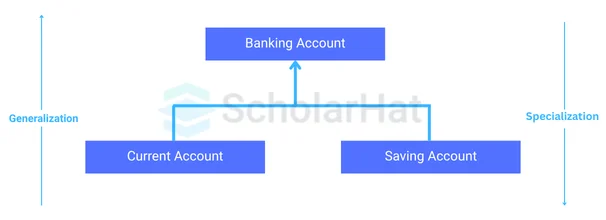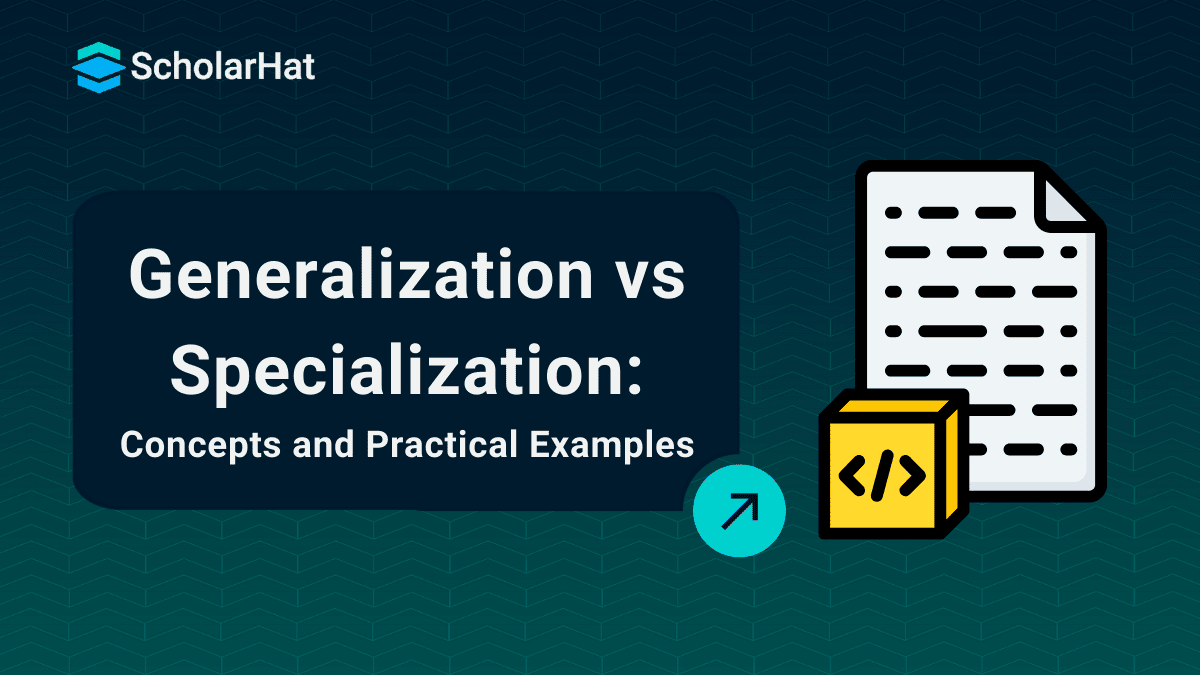06
FebDifference Between Generalization and Specialization
Generalization and Specialization in OOPs
Generalization and Specialization in OOPs are key principles used to create hierarchical relationships between classes. Generalization involves identifying common attributes or behaviors and placing them in a superclass that multiple subclasses can inherit from, promoting code reusability. In contrast, specialization concentrates on expanding a broad class by giving subclasses certain characteristics or functions, allowing for more focused use cases.
This OOPs tutorial will let you know about what is Generalization in OOps, what is Specialization in OOPs, real-world examples of Generalization, Real-world examples of Specialization, the difference between Generalization and Specialization, and many more.
What is Generalization?
Generalization is the process of grouping entities into broader or distributed categories based on certain common attributes. All the common attributes bind together to form a higher-level component or element, which is called a generalized entity. The two different types of entities in a university's database, for example, can be students and professors, where the students are under the professor entity.
In easy words, The process of extracting common characteristics from two or more classes and combining them into a generalized superclass is called Generalization. The common characteristics can be attributes or methods. Generalization in OOPs is represented by a triangle followed by a line.

Features of Generalization in OOPs
- Generalization in OOPS involves creating a superclass that encapsulates shared attributes and methods across related classes.
- It promotes code reusability by allowing subclasses to inherit common functionality.
- Generalization supports abstraction by focusing on the common characteristics of objects.
- It enables polymorphism, where subclasses can implement specialized behaviors while sharing a common interface.
- Generalization establishes a clear class hierarchy, making the code more efficient, modular, and easier to maintain
What is Specialization?
Specialization in OOPs is the reverse process of Generalization, which means creating new subclasses from an existing class. Specialization in OOPs is the process of dividing a parent-level entity into narrower categories according to all the possible child categories. By having the behavior of the opposite of the generalization process, specialization requires the separation of entities based on specific uncommon attributes.
Specialization in OOPs is quite useful in a situation where you block out unnecessary data so you can locate or identify the specific information whenever it is required. Specialized entities can be specialized further due to the higher chance of further modularity.
Features of Specialization in OOPs
- Specialization focuses on creating subclasses that extend a generalized superclass by adding specific attributes or methods.
- It enhances code customization, allowing subclasses to provide unique behaviors that are not present in the superclass.
- Specialization supports modularity by breaking down complex systems into more specific and manageable parts.
- It maintains flexibility, enabling subclasses to override or extend the functionality of the superclass while retaining shared traits.
- Specialization helps in refining class behavior, tailoring it to more specific use cases without modifying the generalized class.
Example- Generalization and Specialization in OOps
Let’s take an example of a Bank Account. A Bank Account is of two types – A current Account and a Saving Account. Current Account and Saving Accounts inherit common/ generalized properties like Account Number, Account Balance, etc., from a Bank Account and also have their own specialized properties like interest rate, etc.

| Read More: |
| Understanding Association, Aggregation, Composition and Dependency relationship |
| Understanding Inheritance and Different Types of Inheritance |
Real-World Example of Generalization and Specialization
You are developing an online e-commerce platform that can manage various goods, including apparel, gadgets, and books. You may generalize the code to eliminate the need to write unique functions for every kind of product.
Let's understand this scenario in different languages such as C# Compiler, Python Compiler, Java Compiler, and C++ Compiler.
using System;
class Product
{
public string Name { get; set; }
public double Price { get; set; }
public Product(string name, double price)
{
Name = name;
Price = price;
}
public virtual string GetDetails()
{
return $"Product: {Name}, Price: {Price} INR";
}
}
// Generalized function to apply a discount
class DiscountHelper
{
public static string ApplyDiscount(Product product, double discount)
{
if (discount < 0 || discount > 100)
{
return "Discount should be between 0 and 100.";
}
double discountedPrice = product.Price - (product.Price * discount / 100);
return $"Discounted Price of {product.Name}: {discountedPrice:F2} INR";
}
}
// Specific product types
class Book : Product
{
public string Author { get; set; }
public Book(string name, double price, string author) : base(name, price)
{
Author = author;
}
public override string GetDetails()
{
return $"Book: {Name}, Author: {Author}, Price: {Price} INR";
}
}
class Electronic : Product
{
public string Warranty { get; set; }
public Electronic(string name, double price, string warranty) : base(name, price)
{
Warranty = warranty;
}
public override string GetDetails()
{
return $"Electronic: {Name}, Warranty: {Warranty}, Price: {Price} INR";
}
}
class Program
{
static void Main(string[] args)
{
// Creating objects for Book and Electronic
Book book = new Book("C# Programming", 500, "Ankita Dubey");
Electronic laptop = new Electronic("Laptop", 50000, "2 years");
// Generalized function works for both products
Console.WriteLine(DiscountHelper.ApplyDiscount(book, 10)); // 10% discount on the book
Console.WriteLine(DiscountHelper.ApplyDiscount(laptop, 15)); // 15% discount on the laptop
}
} class Product:
def __init__(self, name, price):
self.name = name
self.price = price
def get_details(self):
return f"Product: {self.name}, Price: {self.price} INR"
# Generalized function to apply a discount
class DiscountHelper:
@staticmethod
def apply_discount(product, discount):
if discount < 0 or discount > 100:
return "Discount should be between 0 and 100."
discounted_price = product.price - (product.price * discount / 100)
return f"Discounted Price of {product.name}: {discounted_price:.2f} INR"
# Specific product types
class Book(Product):
def __init__(self, name, price, author):
super().__init__(name, price)
self.author = author
def get_details(self):
return f"Book: {self.name}, Author: {self.author}, Price: {self.price} INR"
class Electronic(Product):
def __init__(self, name, price, warranty):
super().__init__(name, price)
self.warranty = warranty
def get_details(self):
return f"Electronic: {self.name}, Warranty: {self.warranty}, Price: {self.price} INR"
# Main logic
if __name__ == "__main__":
# Creating objects for Book and Electronic
book = Book("C# Programming", 500, "Ankita Dubey")
laptop = Electronic("Laptop", 50000, "2 years")
# Generalized function works for both products
print(DiscountHelper.apply_discount(book, 10)) # 10% discount on the book
print(DiscountHelper.apply_discount(laptop, 15)) # 15% discount on the laptop class Product {
protected String name;
protected double price;
public Product(String name, double price) {
this.name = name;
this.price = price;
}
public String getDetails() {
return "Product: " + name + ", Price: " + price + " INR";
}
}
// Generalized function to apply a discount
class DiscountHelper {
public static String applyDiscount(Product product, double discount) {
if (discount < 0 || discount > 100) {
return "Discount should be between 0 and 100.";
}
double discountedPrice = product.price - (product.price * discount / 100);
return "Discounted Price of " + product.name + ": " + String.format("%.2f", discountedPrice) + " INR";
}
}
// Specific product types
class Book extends Product {
private String author;
public Book(String name, double price, String author) {
super(name, price);
this.author = author;
}
@Override
public String getDetails() {
return "Book: " + name + ", Author: " + author + ", Price: " + price + " INR";
}
}
class Electronic extends Product {
private String warranty;
public Electronic(String name, double price, String warranty) {
super(name, price);
this.warranty = warranty;
}
@Override
public String getDetails() {
return "Electronic: " + name + ", Warranty: " + warranty + ", Price: " + price + " INR";
}
}
public class Main {
public static void main(String[] args) {
// Creating objects for Book and Electronic
Book book = new Book("C# Programming", 500, "Ankita Dubey");
Electronic laptop = new Electronic("Laptop", 50000, "2 years");
// Generalized function works for both products
System.out.println(DiscountHelper.applyDiscount(book, 10)); // 10% discount on the book
System.out.println(DiscountHelper.applyDiscount(laptop, 15)); // 15% discount on the laptop
}
} #include <iostream>
#include <string>
#include <iomanip> // for std::setprecision
// Base class (Generalized class)
class Product {
protected:
std::string name;
double price;
public:
Product(const std::string& name, double price) : name(name), price(price) {}
virtual std::string getDetails() const {
return "Product: " + name + ", Price: " + std::to_string(price) + " INR";
}
double getPrice() const {
return price;
}
const std::string& getName() const {
return name;
}
virtual ~Product() {} // Virtual destructor for proper cleanup
};
// Generalized function to apply a discount
class DiscountHelper {
public:
static std::string applyDiscount(const Product& product, double discount) {
if (discount < 0 || discount > 100) {
return "Discount should be between 0 and 100.";
}
double discountedPrice = product.getPrice() - (product.getPrice() * discount / 100);
std::ostringstream result;
result << "Discounted Price of " << product.getName() << ": " << std::fixed << std::setprecision(2) << discountedPrice << " INR";
return result.str();
}
};
// Specific product type: Book
class Book : public Product {
private:
std::string author;
public:
Book(const std::string& name, double price, const std::string& author) : Product(name, price), author(author) {}
std::string getDetails() const override {
return "Book: " + name + ", Author: " + author + ", Price: " + std::to_string(price) + " INR";
}
};
// Specific product type: Electronic
class Electronic : public Product {
private:
std::string warranty;
public:
Electronic(const std::string& name, double price, const std::string& warranty) : Product(name, price), warranty(warranty) {}
std::string getDetails() const override {
return "Electronic: " + name + ", Warranty: " + warranty + ", Price: " + std::to_string(price) + " INR";
}
};
// Main function
int main() {
// Creating objects for Book and Electronic
Book book("C# Programming", 500, "Ankita Dubey");
Electronic laptop("Laptop", 50000, "2 years");
// Generalized function works for both products
std::cout << DiscountHelper::applyDiscount(book, 10) << std::endl; // 10% discount on the book
std::cout << DiscountHelper::applyDiscount(laptop, 15) << std::endl; // 15% discount on the laptop
return 0;
} Discounted Price of C# Programming: 450.00 INR
Discounted Price of Laptop: 42500.00 INR
Explanation
- Generalization: The apply_discount function is generalized because it works for any Product, whether it's a Book, Electronic, or any other product type.
- Real-world relevance: This allows you to avoid duplicating code for different types of products and reuse the same logic for discounts.
Difference between Generalization vs Specialization
Generalization in OOPs works in a bottom-up manner, while specialization works completely more than generalization, where it follows the top-down approach.
The entity of the higher level must always have the lower-level entity in generalization, whereas, in specialization in OOPs, the entities of the top level may not periodically consist of the entities of the lower level.
Generalization in OOPs can be defined as a process where the grouping is created from multiple entity sets, and the Specialization takes a sub-set of the higher-level entity and formulates a lower-level entity set.
Generalization helps to reduce the schema of the data by unifying the multiple components. In Specialization, it expands the schema by multiplying the multiple components.
Generalization leads to a reduction in the overall size of a schema and focuses on specialization. On the other hand, Specialization increases the size of schemas.
| Read More: Top 50 OOPs Interview Questions and Answers |
Conclusion
In object-oriented programming, generalization in oops creates a common base for shared characteristics, promoting code reuse and reducing redundancy. Specialization in oops allows derived classes to extend or modify behaviors for specific needs. Together, they enable flexible, scalable, and maintainable software design. For mastering Java and .NET, Scholarhat provides you with a Full-Stack Java Developer Certification Training Course and a Full-Stack .NET Developer Certification Training Course.






